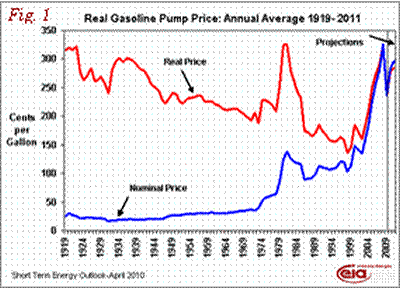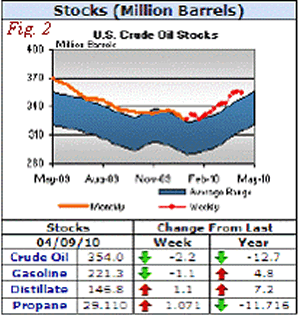Gasoline Makes Crude Oil a Buy on Any Pullback
Commodities / Crude Oil Apr 18, 2010 - 04:16 PM GMTBy: Dian_L_Chu
 Crude futures ended at their lowest point this month Friday, as investors fled riskier assets after regulators charged Goldman Sachs with fraud. West Texas Intermediate (WTI) crude for May delivery settled down at $83.24 a barrel on the New York Mercantile Exchange (NYMEX), the lowest settlement since March 30.
Crude futures ended at their lowest point this month Friday, as investors fled riskier assets after regulators charged Goldman Sachs with fraud. West Texas Intermediate (WTI) crude for May delivery settled down at $83.24 a barrel on the New York Mercantile Exchange (NYMEX), the lowest settlement since March 30.
The Goldman news prompted a broad sell-off, which ended the S&P 500 weekly wining streak. Gasoline also fell more than 2% after the news. Gasoline for May delivery fell to $2.277 a gallon on NYMEX, the largest decline since Feb. 25
Nonetheless, industry insiders are fully expecting this still intact seasonal pattern: a rise in gas prices in the months ahead during the summer driving season (from April 1 to Sept. 30). 
Regular-grade gas prices will average $2.92 per gallon during this summer's driving season, according to the EIA's April 2010 Short-Term Energy and Summer Fuels Outlook. That's up 48 cents from $2.44 per gallon last summer--and higher than the $2.86 current national average. (Fig. 1)
Crude oil represents the biggest cost component and typically makes up between 65% and 70% of the total cost of one gallon of regular gasoline. Oil prices have risen 67% in the past year, and have stayed in the mid-$80 range after jumping to above $87 earlier this month.
Crude futures were already trading lower prior to the Goldman news on the usual pattern of Friday`s being profit taking days for traders not wanting to carry positions into the weekend. However, the Goldman news exacerbated the sell-off in the crude market, as new information was being digested by investors.
But the dynamics that make Crude Oil and other asset classes like Gold and Equities attractive for investors going forward are still in play with zero-percent interest rates, global governmental printing presses, currency devaluations, and lack of alternative investment classes like real estate or large scale industrial projects which rely on much healthier credit markets to finance.
Crude Oil has one other factor that Gold and Equities do not have going for them right now. This is the heat of the seasonal summer driving season where the weather is much nicer, people take advantage of the nicer weather to get out and travel more, take vacations over the holidays, and use more gasoline in this April through July stretch. This seasonality dynamic causes prices at the pump to rise due to increased demand, which raises the price of Crude Oil in the process.
It is this increasing gasoline demand that will drive Crude Oil for the next 10 to 12 weeks from the products side, and it is the reason that Crude is one of the favorite asset classes for investors during this seasonal driving season.
So expect any pullbacks in Crude over the next 12 weeks to be bought up by investors, and look for Oil prices to be higher each month as gasoline prices at the pumps rise to meet the increased driving demand.
 The latest inventory data supports this view as the government reported a bullish inventory report with a surprise drawdown of 2.2 million barrels in domestic crude supplies in the week to April 9. Gasoline data also showed a 1.1 million-barrel drawdown. (Fig. 2)
The latest inventory data supports this view as the government reported a bullish inventory report with a surprise drawdown of 2.2 million barrels in domestic crude supplies in the week to April 9. Gasoline data also showed a 1.1 million-barrel drawdown. (Fig. 2)
The recent pullback in Crude Oil provoked by the SEC’s Goldman charges could be one rare entry point for investors at the start of the annual driving season uptrend.
A decline in crude stocks and bigger-than-expected draws in gasoline stocks coupled with global equity markets rallying and zero interest rate policies puts a bullish backdrop firmly in place, making a demand driven run to $90 and beyond seem likely before the July 4 weekend.
Dian L. Chu, M.B.A., C.P.M. and Chartered Economist, is a market analyst and financial writer regularly contributing to Seeking Alpha, Zero Hedge, and other major investment websites. Ms. Chu has been syndicated to Reuters, USA Today, NPR, and BusinessWeek. She blogs at Economic Forecasts & Opinions.
© 2010 Copyright Dian L. Chu - All Rights Reserved Disclaimer: The above is a matter of opinion provided for general information purposes only and is not intended as investment advice. Information and analysis above are derived from sources and utilising methods believed to be reliable, but we cannot accept responsibility for any losses you may incur as a result of this analysis. Individuals should consult with their personal financial advisors.
© 2005-2022 http://www.MarketOracle.co.uk - The Market Oracle is a FREE Daily Financial Markets Analysis & Forecasting online publication.



